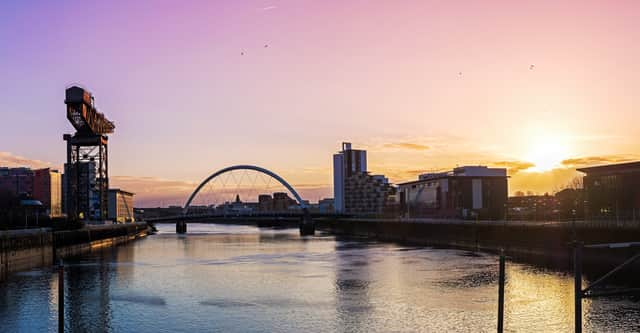River Clyde described as ‘best untapped development opportunity in Western Europe’ by top architect
and live on Freeview channel 276
The demise of the shipbuilding industry has had a negative impact on the river which was crucial to Glasgow's boom era as the 'second city of the empire'.
Professor Alan Dunlop, one of Scotland's most notable architects, has been fascinated by the Clyde since he was a student and is frustrated with perceived inaction to regenerate the riverside.
Advertisement
Hide AdAdvertisement
Hide AdA recent strategy report put the riverside centre stage, describing the River Clyde as being "perhaps the greatest untapped development opportunity in Western Europe".
Professor Dunlop said: "It is remarkable how little has happened or been orchestrated by the people who make things happen.
"This is the river that made the city. I know there is a new initiative being planned by Glasgow City Council leader Susan Aitken, but it seems to me it is only one of a number of possible things that are going to happen that never seem to come off."


Professor Dunlop, a Fellow of the Royal Incorporation of Architects in Scotland and the Royal Society of Arts who trained at the Mackintosh School of Architecture, said one of the problems in developing the riverside is ownership.
Advertisement
Hide AdAdvertisement
Hide AdHe added: "It might be hard to believe but it is difficult to track down who owns vast tracks of the riverfront, so it is difficult to make connections from the city centre even out to the new transport museum because you are potentially passing by land that no-one knows who owns it.
"The city council have always been reluctant to instigate compulsory purchase orders because that leads to potential legal problems.
"There is also the problem of the Clydeside Expressway, which at the time it was conceived in 1945, the river was an industrial river. There wasn't really any need for anyone to go down there unless they were building a ship.
"So, the Clydeside Expressway really cuts off the whole of the west end down to the riverfront and that is a major transportation and infrastructure challenge to do something with that.
Advertisement
Hide AdAdvertisement
Hide Ad"I think that various councils, or administrations, have looked at this but have thought the problems associated with it are just insurmountable.
"They only have a four-year window to look ahead before elections, so they just don't take it any further forward.
"I've done many presentations on the potential of it and in 1996, when Glasgow had won the title of the European City of Architecture and Design for 1999, I was asked if I would chair the Glasgow Institute of Architects committee which ran for that and I tried to make it as a focus that the brief for 1999 should be about the development of the riverfront.
"But the director at the time had little interest and instead we saw the development of the Lighthouse building and new housing developments at the Trongate - homes for the future."
Advertisement
Hide AdAdvertisement
Hide AdHe said initiatives seem to be on a piecemeal basis and is now calling for a deep investigation into what is possible for the river.
He added: "There has to be a collective agreement by Glasgow City Council and the Scottish Government that the regeneration of the River Clyde is a fundamental part of the future of this city.
"We have a river that nothing really of any substance is actually happening on it and we have to do something with it.
"I think it is time to get everyone with an interest in the river around the table to hammer out a strategic way forward for how we do this.
Advertisement
Hide AdAdvertisement
Hide Ad"One of the positives about the river is the new bridges. I'm from the north of the city and in my generation, if you lived in the north you would never dream of going to the south and vice versa, but the bridges connect both north and south and is a great development."
For an area which used to employ thousands, the river was the lifeline of the city but after the shipyards closed, Professor Dunlop feels that Glaswegians almost became embarrassed about it.
Professor Dunlop said: "Few cities of the world have rivers running through the centre of them and even less make good use of them.
"Great cities such as Paris, make use of their river, but Glasgow just doesn't seem to be able to harness that.
Advertisement
Hide AdAdvertisement
Hide Ad"It makes complete sense to do something with the river, but I think Glaswegians were embarrassed by the decay in the river with the decline in shipbuilding.
"They didn't want to focus so much on the riverfront. So much of the city was made from the river, but so little has actually happened since the decline of shipbuilding."
Comment Guidelines
National World encourages reader discussion on our stories. User feedback, insights and back-and-forth exchanges add a rich layer of context to reporting. Please review our Community Guidelines before commenting.